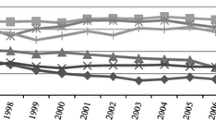Abstract
Carbon tax has been advocated as an effective economic instrument for the abatement of CO2 emission by various countries, including China, the world’s biggest carbon emission country. However, carbon emission abatement cannot be done while ignoring the impact on economic growth. A delicate balance needs to be achieved between the two to find an appropriate pathway for sustainable development. This paper applies a multi-objective optimization approach to analyze the impact of levying carbon tax on the energy-intensive sectors of Guangdong province in China under the constraint of emission reduction target. This approach allows us to evaluate carbon emission minimization while maximizing GDP. For policy analysis, we construct five scenarios for evaluation and optimal choice. The results of the analysis show that a lower initial carbon tax rate is not necessarily better, and that a carbon tax is an effective means to reduce CO2 emissions while maintaining a certain level of GDP growth.


Similar content being viewed by others
References
Boyd R, Krutilla K, Viscusi WK (1995) Energy taxation as a policy instrument to reduce CO2 emissions: a net benefit analysis. J Environ Econ Manag 29(1):1–24
Cao Y, Wang ZY (2015) Comparative research on carbon trading and carbon tax mechanism. Theory Pract Financ Econ 36(197):97–102
Clough S (2015) Achieving CO2, reductions in Colombia: effects of carbon taxes and abatement targets. Energy Econ 97(4):451–454
Dissou Y, Siddiqui MS (2014) Can carbon taxes be progressive? Energy Econ 42(1):88–100
Elkins P, Baker T (2011) Carbon taxes and carbon emissions trading. J Econ Surv 15(3):325–376
European Environment Agency (EEA) (1996) Environmental taxes-execution and environmental benefits
Fitz Gerald J, Mccoy D (1992) The economic effects of carbon taxes. Research 28(3):9–14
Gao PF, Chen WY (2002) Carbon tax and carbon emissions. Tsinghua Sci Technol 10:1335–1338
Goulder LH (1995) Effects of carbon taxes in an economy with prior tax distortions: an intertemporal general equilibrium analysis. J Environ Econ Manag 29(3):271–297
IPCC (1990) IPCC guidelines for national greenhouse gas inventories
IPCC (1995) IPCC guidelines for national greenhouse gas inventories
IPCC (2001) IPCC guidelines for national greenhouse gas inventories
IPCC (2006) IPCC guidelines for national greenhouse gas inventories
IPCC (2013) IPCC guidelines for national greenhouse gas inventories
Jeff P, Owen AD (2009) Emission trading schemes: potential revenue effects, compliance costs and overall tax policy issues. Energy Policy 37(1):4595–4603
Jorgenson DW, Kopp R (1992) Carbon taxes and economic welfare. Harvard Institute of Economic Research working papers 2, pp 393–454
Lee CF, Lin SJ, Lewis C, Chang YF (2007) Effects of carbon taxes on different industries by fuzzy goal programming: a case study of the petrochemical-related industries, Taiwan. Energy Policy 35(8):4051–4058
Li CS, Fan Y, Zhu L (2012) The study of carbon dioxide emission intensity abatement mechanism of iron and steel industry based on two-stage game model. Chin J Manag Sci 20:93–100
Liu J, Li W (2011) Effects of introduction carbon tax on China’s economy. China Popul Resour Environ 21:99–104
Liu Y, Lu Y (2015) The Economic impact of different carbon tax revenue recycling schemes in China: a model-based scenario analysis. Appl Energy 141(1):96–105
Liu L, Chen C, Zhao Y, Zhao E (2015) China's carbon-emissions trading: overview, challenges and future. Renew Sustain Energy Rev 49:254–266
Lu C, Tong Q, Liu X (2010) The impacts of carbon tax and complementary policies on Chinese economy. Energy Policy 38(11):7278–7285
Ma X, Wang Z, Tang Q, Zhu Y (2016) The impact assessment of global carbon tax policy on carbon emission and the world economy. Clim Change Res 12(3):217–229
Manne AS, Richels RG (1990) CO2 emission limits: an economic cost analysis for the USA. Energy J 2(11):51–74
Masood E (1997) Asian economies lead increase in carbon dioxide emissions. Nat Int Wkly J Sci 388(6639):213
Pereira AM, Rui MP, Rodrigues PG (2016) A new carbon tax in Portugal: a missed opportunity to achieve the triple dividend? Energy Policy 93:110–118
Scholes RJ, Noble IR (2001) Storing carbon on land. Science 294(5544):1012–1013
Scrimgeour F, Oxley L, Fatai K (2005) Reducing carbon emissions? the relative effectiveness of different types of environmental tax: the case of New Zealand. Environ Model Softw 20(11):1439–1448
United Nations Framework Convention on Climate Change (UNFCCC) (2015) The 21st yearly session of the conference of the parties (COP), Paris, France, November 30. http://unfccc.int/meetings/paris_nov_2015/meeting/8926.php
Wang WJ, Fan YQ (2012) Empirical research on effects of carbon taxation on regional energy consumption, economic growth and income distribution. Resour Environ Yangtze Basin 4:442–447
Wang X, Li JF, Zhang YX (2011) An analysis on the short-term sectoral competitiveness impact of carbon tax in China. Energy Policy 39(7):4144–4152
Wang WJ, Xie PC, Hu JL, Zhao DQ (2016) Analysis of relative mitigation cost advantages of carbon tax and ETS for the cement industry. Clim Change Res 12(1):53–60
Wissema W, Dellink R (2014) AGE analysis of the impact of a carbon energy tax on the Irish economy. Ecol Econ 61(61):671–683
Yao X, Liu XY (2010) Optimal carbon tax in China with the perspective of economic growth. Econ Res 11:48–58
Zhang WM, Zhang JL (2009) Analysis on effects of carbon taxation on economic development energy consumption and income distribution. Technol Econ 28:48–51, 95
Zhu YB, Liu X, Wang Z (2010) Abatement effect of carbon tax and its impacts on economy in China. China Soft Sci Mag 4(1–9):87
Acknowledgements
This research was supported by the National Basic Research Program of China (973 Program), National 973 Project No. 2012CB955800, and the National Social Sciences Foundation of China No. 14CJY032. We are indebted to the anonymous reviewers for their valuable comments and suggestions.
Author information
Authors and Affiliations
Corresponding author
Rights and permissions
About this article
Cite this article
Liu, X., Leung, Y., Xu, Y. et al. The effect of carbon tax on carbon emission abatement and GDP: a case study. J Geogr Syst 19, 399–414 (2017). https://doi.org/10.1007/s10109-017-0254-1
Received:
Accepted:
Published:
Issue Date:
DOI: https://doi.org/10.1007/s10109-017-0254-1




